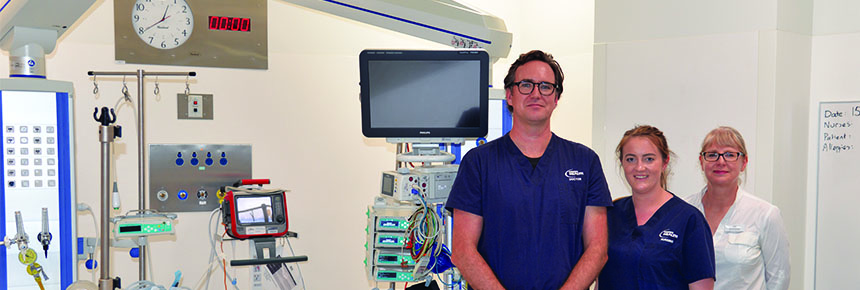 From left: Dr Richard Smith and clinical nurse specialist Ellie Davis from the emergency department, pictured with clinical nurse educator Kim Fuzzard. Bendigo Health's ED and Intensive Care Units work in unison during cardiac arrest events.
From left: Dr Richard Smith and clinical nurse specialist Ellie Davis from the emergency department, pictured with clinical nurse educator Kim Fuzzard. Bendigo Health's ED and Intensive Care Units work in unison during cardiac arrest events.
Patients suffering a cardiac arrest at Bendigo Health have slightly better or similar long-term survival rates than patients at metropolitan hospitals across Australia, results of a new study have found.
A group of staff at Bendigo Health - led by medical student Zak Doherty - conducted a retrospective study of 629 cardiac arrests in the hospital from 2000-2017.
The study combined almost 20 years of internal cardiac arrest data from Bendigo Health with Victorian death records to create the first study of its kind for a regional hospital in Australia.
The clinical paper, published in the international scientific journal ‘Resuscitation’, found 34 per cent of cardiac arrests in patients at Bendigo Health survived until discharge, while 27 per cent of patients were alive one year later.
The results were slightly better or equal to most metropolitan hospitals in Australia, and significantly better than UK and US hospitals (24 and 18 per cent respectively).
Other global studies of one-year survival rates from in-hospital cardiac arrests were at 14 per cent.
Co-author of the paper, Critical Care Nurse Educator Kim Fuzzard, said the results were testament to the ongoing resuscitation training and expert care provided by nurses and doctors who form the resuscitation team.
“Given that a cardiac arrest is such a catastrophic event, the results are really impressive. It’s pleasing to know our patients are receiving high-quality care,” she said.
A cardiac arrest is defined as an event when a patient's heart stops beating.
Kim was part of a group of staff at Bendigo Health that set up a data recording and review system for cardiac arrests 20 years ago.
As Kim explains the aim was to drive clinical improvement.
“At a fundamental level we needed to know if we were doing a good job or not and if we weren’t - how to improve it,” she said.
The data is used by a ‘code blue’ review group at Bendigo Health to compare the performance of rescuer teams against national resuscitation guidelines, which promotes the continuous improvement of care.
Bendigo Health has approximately 50 cardiac arrests a year, however, according to the study, the rate of code blues has declined.
“The Medical Emergency Team (MET) has helped with that, because we’re intervening earlier, before patients deteriorate. Some patients decide it’s not in their best interest to undergo resuscitation as part of their end of life planning so that perhaps has influenced the figures,” Kim said.
To read the clinical paper, click here.